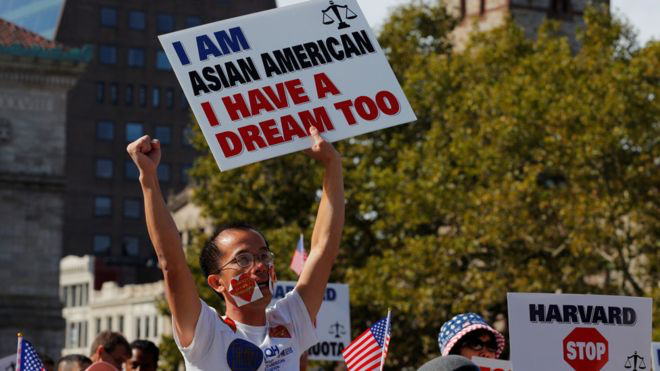ROBERT BORN WRITES– Harvard University, with one of the most prestigious colleges in the United States, known for its highly competitive undergraduate admissions process, is being challenged in court on allegations of racism and discrimination Asian-Americans. A Federal District Court in Boston is expected to rule in the Harvard Anti-Discrimination Lawsuit sometime this month or next. Any decision will likely be repealed to the supreme court and could have a potentially lasting and drastic effect on Affirmative Action.
Students for Fair Admissions (SFFA), the group behind the lawsuit, claims that Asian-Americans are held to a higher standard for admissions than African-American, Latino and even white applicants due to Harvard’s personality rating. While Asian-Americans applicants typically score the highest GPA and SAT scores, they are given lower personality scores, which the group claims to be highly subjective. –including scores assigned on likability and courage.
The group also found, according to school policy, that Asian-American males who live in rural states must score 1370 on the PSAT to receive a letter informing them to consider Harvard, whereas white males also residing in rural states only need to score 1310. Harvard has argued that these letters of invitation do not guarantee admissions and are simply sent to encourage students to apply that might never have. Finally, the group believes that Harvard has no explanation for the fact that Asian-Americans receive lower personal ratings. and Harvard admission officers were willing to testify as to why this occurred.
However, The motives behind this lawsuit are questionable as Edward Blum, one of the lead strategists behind Students for Fair Admissions, has a staunch conservative track record. “I get angry and frustrated because there’s this white guy saying that he supports Asian-Americans,” Harvard senior Jang Lee said. “When you look at his [Edward Blum’s] track record, it’s very clear that he does not care about Asian-Americans or people of color.”
Throughout the lawsuit, Harvard, in fact, says it considers race just one of many factors for its more than 40,000 applicants, and that race can only, help not hurt, an applicant— noting that a diverse student body is important to university values. Lawyers for Harvard have denied these claims, saying that the group has not brought forth a single specific student claiming to be rejected from the school based on race. “It’s not just that SFFA has failed to provide a smoking gun, they failed to find evidence of a single victim of discrimination,” said Harvard attorney Seth Waxman.
Many Asian-Americans, however, tend to support affirmative action policies.
Throughout this trial, many in the media have portrayed Asian-Americans as taking anti-affirmative action stances; but according to data and public opinion, Asian-Americans have displayed greater support for affirmative action than against it, regardless of how the question is posed, and this support has remained relatively stable for most ethnic groups, whether Korean-Americans, Indians, Vietnamese, and Filipinos. It must be stated as well that there is little research on this issue and public opinion conducted on the views of Asians and Asian-Americans on any issue in the U.S. is limited compared to the copious amount of research on other groups, which might skew some perceptions.
Even with this lawsuit, many Asian-Americans still support affirmative action policies. Lance Tran, a student at Duke University, penned an article for his school newspaper that garnered mass attention for his support of affirmative action during the height of the court case last year. He concluded, “As the child of refugees and a proud first-generation student, I am as undeniably Asian-American as the students suing Harvard, Yale and UNC. And I am proud to support affirmative action.”
While it is important that no student is wrongfully rejected from any university, diversity must continue to be a significant interest for all institutions of higher education, and access to these prestigious places must be available for all students, regardless of race. GPAs and test scores are not the only important factor in an application.

